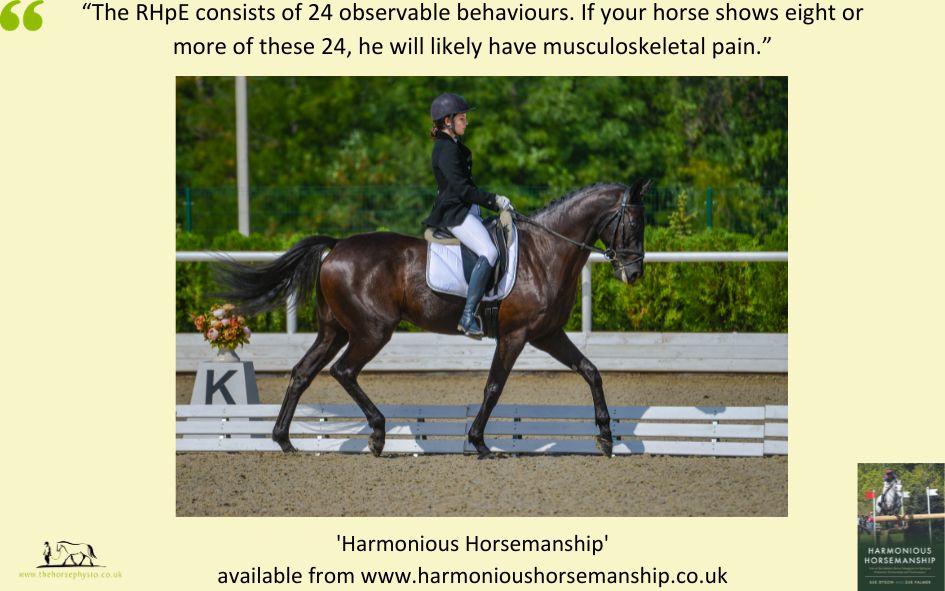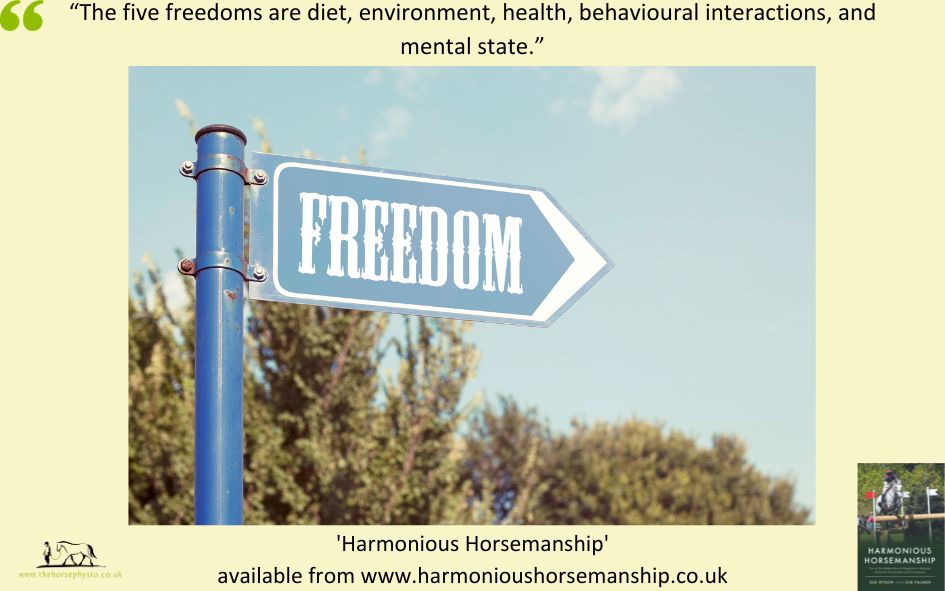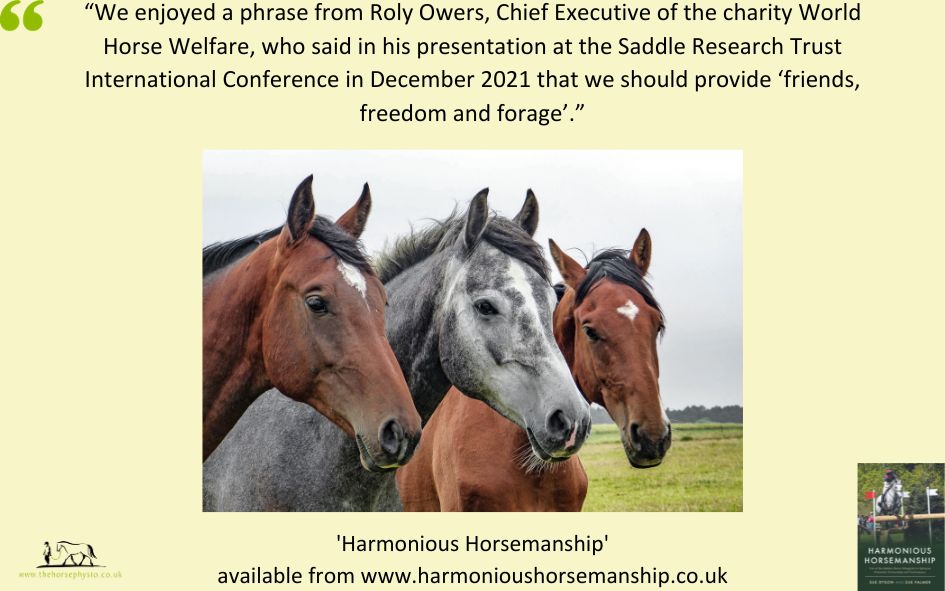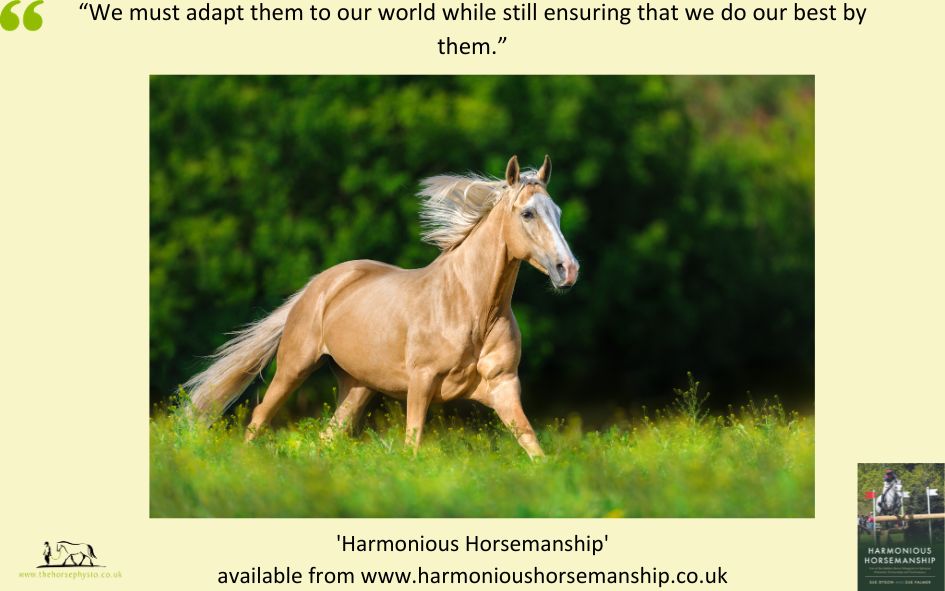What are the Five Freedoms?
The Five Freedoms are part of the UK government’s Animal Welfare Act 2006 and ensure that all animals receive a suitable standard of care. The five freedoms are diet, environment, health, behavioural interactions, and mental state. So, your horse must have food and water and live in a pleasant environment with room to stretch, turn, and lie down. He must be kept healthy, a vet must be called when necessary, and he must be allowed behavioural interaction per his natural inclinations. A horse is a herd animal; he needs some form of company and deserves to be happy, not bullied or abused. While these points may seem obvious, this legislation allows people to be prosecuted under the Welfare Act and have their animals removed from them. As good horse owners, we hope always to meet these five freedoms, but health can be challenging to unravel. Say you have bought a new horse. He is a lovely horse, but a few things are causing a problem. He puts his ears back when you do up his girth, but his owner told you he did that. He is lazy in the school and hard to get on the bit, but you mainly want to hack him, so that doesn’t matter. He drags his hind toes when you are going downhill, but he seems happy enough. Your trainer says to use longer spurs and a whip to get him forward in the school; everyone on the yard tells you to ignore his ears going back when you girth him. He passed his vetting, so he is okay, isn’t he?
How does the Ridden Horse Performance Checklist fit into the Five Freedoms?
This is where the Ridden Horse Performance Checklist (RHpE) comes in. While singularly, these behaviours may not indicate anything, they paint a different picture together. The RHpE consists of 24 observable behaviours. If your horse shows eight or more of these 24, he will likely have musculoskeletal pain. In our example above, the horse, when assessed using the RHpE, is shown to be in pain. A thorough veterinary investigation reveals pain in a hindlimb, and a course of treatment follows. On being bought back into work, his ears no longer go back when the girth is done up; he is happy and forward in the school, and he doesn’t drag his toes going downhill. By using the information the horse gives you, you have ensured his health and happiness. Without the RHpE, you could have continued to ride your horse even though he was in pain. Horses can be incredibly stoical and patient, so it can be hard to tell when they are suffering.

What you can do to ensure that your horse enjoys the Five Freedoms
Think about your horse’s life, his day-to-day living. In the book Harmonious Horsemanship, which explores and explains the RHpE, the authors Sue Dyson and Sue Palmer state: “We enjoyed a phrase from Roly Owers, Chief Executive of the charity World Horse Welfare, who said in his presentation at the Saddle Research Trust International Conference in December 2021 that we should provide ‘friends, freedom and forage’.” This is a lovely way to put it. Does your horse have this? Does he get turned out? Is he allowed to be a horse and do horse things? Hang out with his friends, roll in the mud? Does he get the right food for his work and health? Is he allowed to graze happily in the sunshine? We know that most horses are kept on livery yards and that land is in short supply, but it is part of our responsibility as good horse owners to advocate for our horses. If you don’t like how the horses are kept on your yard, consider moving.
Adapting to a changing world
In an ideal world, our horses would live like they do in the wild, in herds wandering freely across endless grasslands. Realistically, we are creating an artificial environment that draws similarities from their historic habitat. So, generally, horses can’t be out 24/7, as the land needs preserving. Having the odd 24 hours in, if there is torrential rain, for example, is sensible as it preserves the grass, but keeping horses in 24/7 over several days or weeks is not good for their physical or mental health. Many yards have individual turnout, but you will see the horses hanging out together or chatting over the fence, so they still enjoy social contact. We have to do our best with the resources that we have. If we ride our horses, they sweat, so we clip them to reduce this, and then they need rugging to keep them warm. We must adapt them to our world while still ensuring that we do our best by them.
Interested? Learn more about the RHpE
Learning about the RHpE gives you the tools to help keep your horse healthy and happy. It will help you continue giving your horse the Five Freedoms he deserves. The RHpE will provide a scientifically researched framework to check whether your horse is in pain. If you want to learn more about the RHpE and order your copy of Harmonious Horsemanship, visit the website www.harmonioushorsemanship.co.uk.



